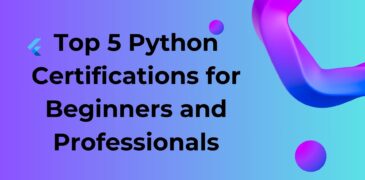Python certifications are invaluable for both beginners and professionals, offering a structured pathway to mastering this versatile programming language. Geared towards beginners, these certifications cover fundamental concepts, syntax, and problem-solving skills, providing a solid foundation for further exploration. For professionals, certifications delve into specialized areas like web development, data science, and artificial intelligence, showcasing expertise in relevant Python libraries and frameworks. Certifications not only validate skills but also signal commitment to continuous learning in the rapidly evolving tech landscape, ensuring individuals stand out in the competitive job market and remain at the forefront of industry innovation.
Python Certifications for Beginners and Professionals are:
PCAP Certified Associate Python Programmer certification
PCAP Certified Associate Python Programmer certification provides a comprehensive validation of an individual’s proficiency in Python programming, particularly focusing on the advanced aspects of Object-Oriented Programming (OOP). The certification encompasses various essential topics, including OOP essentials, modules and packages, exception handling, advanced string operations, list comprehensions, lambdas, generators, closures, and file processing.
The certification is especially beneficial for aspiring programmers, career changers, and industry professionals aiming for roles in software development, data analytics, security, networking, IoT, and engineering. It not only equips learners with foundational Python knowledge but also positions them for more advanced and specialized roles, making them valuable assets in the ever-evolving tech industry. The PCAP™ certification is a gateway to diverse career opportunities, reflecting a commitment to excellence and proficiency in Python programming.
Google IT Automation with Python Professional Certificate
The Google IT Automation with Python Professional Certificate, offered through Coursera, is a comprehensive program designed to equip learners with in-demand skills to advance their careers in IT. Taught in English by top instructors from Google Career Certificates, the course boasts an impressive enrollment of 668,054 participants. With a stellar 4.8 rating from 36,121 reviews, it’s evident that learners are finding immense value in this program.
The certificate covers a six-course series, emphasizing practical skills such as automating tasks through Python scripting, utilizing Git and GitHub for version control, and managing IT resources at scale, both for physical machines and virtual machines in the cloud. The curriculum focuses on real-world IT problems, teaching learners to analyze issues and implement effective strategies for resolution. Participants gain expertise in configuration management, Python programming, version control, troubleshooting, and debugging, along with valuable automation skills.
IBM Data Science Professional Certificate
The Data Science Professional Certificate from IBM signifies a badge earner’s readiness for a career in data science, showcasing a demonstrated ability to tackle real-world problems using a comprehensive skill set. Participants acquire proficiency in Data Science methodology, utilizing Jupyter notebooks and creating Python applications. The certificate holder gains the capability to access relational databases through SQL and Python, employ Python libraries for data visualizations, and conduct data analysis using Pandas.
The badge also indicates the badge earner’s competence in constructing and evaluating Machine Learning (ML) models using Scikit-learn and SciPy. Moreover, they showcase an adept application of data science and ML techniques to real location datasets, highlighting practical skills in the industry.
The Skills section lists a broad array of competencies, including Artificial Intelligence (AI), data visualization tools like Bokeh and Matplotlib, database management with Db2, and proficiency in various Python libraries such as NumPy, Pandas, Seaborn, and Scikit-learn. The badge holder is also well-versed in location-based data analysis using tools like Folium and Foursquare.
AWS Certified Developer – Associate certification
The AWS Certified Developer – Associate certification stands as a testament to an individual’s comprehensive understanding of core AWS services, architectural best practices, and proficiency in developing, deploying, and debugging cloud-based applications on the AWS platform. This certification not only instills confidence and credibility in certified individuals but also holds significant value for organizations seeking AWS talent.
Designed as a starting point on the AWS Certification path, this certification is ideal for individuals with developer experience, a solid grasp of high-level programming languages, familiarity with AWS technology, on-premises IT expertise, and experience with other cloud services. The exam, AWS Certified Developer – Associate (DVA-C02), features a combination of multiple-choice and multiple-response questions, challenging candidates to showcase their expertise in real-world scenarios.
Earning the AWS Certified Developer – Associate certification requires careful preparation. While specific training is not mandatory, AWS provides resources such as the exam guide, sample questions, and additional learning materials to help candidates build the necessary knowledge and skills.
Microsoft Certified: Python Developer Associate
Microsoft Learn offers a robust collection of free learning resources through its platform, with a particular focus on enhancing proficiency in Python programming. The “Python for beginners” path serves as an introductory course, providing learners with a solid foundation in Python basics. It guides them through using Python to solve mysteries and uncover answers, making the learning experience engaging and practical. Aspiring Python enthusiasts can grasp the essentials and gain confidence in their coding skills.
For those looking to elevate their Python expertise, the “Build real-world applications with Python” learning path is a valuable resource. Participants delve into practical application development, honing their skills in creating solutions that address real-world challenges. This path caters to learners eager to transition from theoretical knowledge to hands-on implementation
Conclusion
In conclusion, Python certifications serve as a pivotal tool for both beginners and professionals, offering structured pathways to master this versatile programming language. For beginners, certifications provide a solid foundation in Python’s fundamentals, while professionals can specialize in areas like web development, data science, and machine learning. These certifications not only validate skills but also enhance confidence and credibility. As the demand for Python expertise continues to grow, obtaining a certification is a strategic investment, opening doors to diverse career opportunities and ensuring that individuals stay at the forefront of innovation in the dynamic field of technology.
Also Read:







